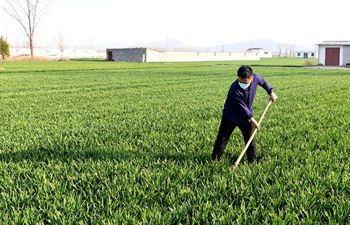NAIROBI, Feb. 23 (Xinhua) -- Joseph Gichuhi's four-acre farm that is located at the heart of central Kenyan county of Nyeri was a spectacle to behold on Wednesday evening as a swarm of desert locusts hovered over the green foliage, and farmers made frantic efforts to chase them away.
Gichuhi's farm, which is sandwiched by rolling hills, is a case study in inter-cropping as well-tended coffee bushes stand shoulder to shoulder with bananas, maize, cassava and sweet potato veins.
The 54-year-old father of two was in a composed demeanor even as swarms of desert locusts descended on crops and vegetation in a farm he inherited from the aging parents, amid threat of food security and income for his family.
"We never expected the locusts to land on our farms with dizzying speed and thought they were only confined to semi-arid parts of this country, " Gichuhi told Xinhua as he gazed at the apex of trees that swayed under the weight of desert locusts.
There was palpable anxiety and a sense of curiosity as neighbors thronged Gichuhi's farm to have a closer look at the menacing pests that have now spread to 18 Kenyan counties where they are devouring green vegetation in their path.
"Many farmers are worried about the fate of their crops now that the locusts are here with us. In the meantime, we are organizing ourselves to find a better way of chasing them away before they cause havoc on our farms," said Gichuhi.
He revealed that a swarm of desert locusts descended on his farm in the late afternoon on Feb. 18, triggering an urge to act with speed and halt their destruction on nearly matured crops and livestock fodder.
"We can only hope the government will swing into action and conduct aerial spraying of these locusts before they cause calamity in our farms. It is too early to quantify the damage the desert locusts have caused but the situation remains dire," said Gichuhi.
He vowed to remain alert and leverage on the goodwill of farmers in the nearby villages who have answered the call for arms in the light of desert locust invasion.
The peaceful ambiance in the village of Nyeri was abruptly disrupted as swarms of desert locust invaded farms and indigenous forests.
Samwel Ngacha, a 50-year-old father of four who owns a six acres farm that he inherited from his parents, was among the first responders when the locusts were spotted in his backyard.
"I even managed to take a video of the locusts that caused a stir as they flew over our farms. We beat drums and made noises to chase them when they landed on my farm and managed to devour grass and maize leaves," said Ngacha.
The part-time motorcycle rider said the locusts that landed in his ancestral village unexpectedly, seemed to have originated from the semi-arid plains of neighboring Kirinyaga county.
"It is hard to believe that our county is the latest casualty of the desert locust infestation. We hope local authorities will act with speed to stop the destruction of food crops and livestock fodder," said Ngacha.
Ngacha's story mirrors the agony many farmers in central Kenya and beyond are grappling with as the menace of desert locusts linger on despite concerted efforts by the government and multilateral partners to eradicate them.
Government statistics indicate that desert locusts have spread to 18 counties, aided by humid weather and above normal rains that pounded the larger eastern African region from Oct. 19 to January this year.
Kenyan small-scale farmers have nevertheless been nudged into action as the worst desert locust invasion in the country in the last 70 years, threatens to obliterate key staples like maize, beans and potatoes.
James Mwangi, a middle-aged farmer who grows arrowroots, mangoes, fresh produce and Napier grass in his half an acre farm located on the edge of a hillside in Nyeri county, said that he was determined to confront the virulent pests as they marched towards his locality.
"So far we have only witnessed a small number of locusts near our farms but we are aware bigger swarms are forming in the vicinity to strike and destroy our crops," said Mwangi.
However, we have intensified round the clock surveillance to minimize the damage the locusts could cause in the farms," he added.
At the expansive semi-arid plains of Mwingi, in the upper eastern Kenyan county of Kitui, desert locusts have become a nightmare to farmers as they devour green foliage with abandon.
Stephen Matei, an administrator in Kitui County said the locusts have been destroying crops and pasture in a region synonymous with acute food and nutrition insecurity.
"We have estimated that we have lost about 100 metric tons of food since the locusts' invaded farms in late January," said Matei.
He said that farmers have turned to novel methods of fighting the pests while both the national and county governments have joined hands to conduct aerial spraying to contain their relentless march.













